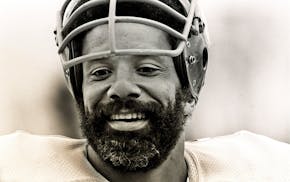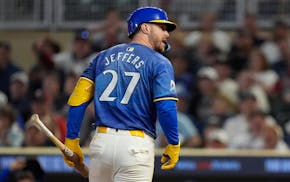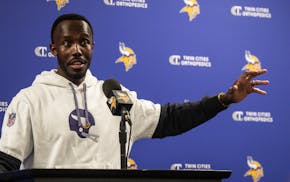Lee Adams might have the best job in the world: He's the public address announcer for the St. Paul Saints.
His background is in theater and comedy. He also grew up a Boston Red Sox fan. So when the Saints came calling more than a decade ago, seeking to jazz up what can be a ho-hum gig, he jumped at it.
Eye On St. Paul recently chatted with Adams near CHS Field to talk about working Saints games and some of his more memorable moments. This interview was edited for length.
Q: How did you get this very cool job?
A: In 2013, we were still back at Midway [Stadium] and they decided they were going to change things around a little bit in the front office. And they hired an entertainment director. They hired Brian Kelly, who I've known for 30 years.
I had just gone up north to work on Gunflint Lake and fish-guiding and helping some friends who run a resort, and he called me one day and he said, "I've had this idea of two PAs in easy chairs, like two guys watching the game. I've been racking my brain trying to think of a Lee Adams type, and then I thought, 'Why don't I just call Lee Adams?'"
Q: What is a Lee Adams type?
A: What he said was he wanted a sort of gruff guy's guy. And even though I've been in theater my whole life, I know I kind of come across that way. I spend a lot of time in the outdoors camping. He wanted sort of a gruffer, middle-aged, baseball, Chicago cigar-chomper.
Q: You're doing a whole lot more than introducing a batter or talking about a pitcher. Why was that decision made, to be more than a public address announcer?
A: It came from the initial idea of [previous owners] Mike Veeck and Marv Goldklang. The idea at the time was we had this Metrodome, with indoor baseball. And Mike's idea was to make [Saints games] accessible to everybody. Part of that idea was to have an announcer who could bring some levity.
Q: For a long time, it seemed like the baseball was secondary. Now that you're the Twins' AAA team, the baseball is more serious. How do you balance that?
A: Well, it's been a dance. I'm very aware that [some fans] felt like just what you said: That it was going to become about the baseball and corporate and the fun was going to go away. But from Day One, our focus hasn't been about the baseball. That kind of got easier because the Twins handle the team.
There are some different parameters that we have to abide by. For instance, the one that's the biggest, the most obvious for us, is the pitch clock. There is no longer a long time to do things. But we have found ways. We've got robot umpires coming in. Well, I can have a lot of fun heckling a robot umpire.
Q: What difference has the pitch clock made to your job?
A: The pitch clock has made it difficult, just because there's a certain amount of information that I am responsible for disseminating throughout the game. A lot of it is scripted. I've got a set of about 10 pages of these little reads that we have to work in when there's time. Well, the pitch clock has shortened that time.
Q: You have a background as a comedy writer. How hard was it for you to become a baseball guy?
A: I loved sports growing up. Loved baseball. Grew up in Boston. I came out here in '89, and when the Saints started, man, I just loved the whole idea of it.
Q: You're allowed to be a homer, right?
A: Oh, yeah. Totally. And we are. We do this thing called "secret pitcher's mound microphone." When the catcher comes out to talk to the pitcher, we say: "Hey, what do you want to eat after the game?"
The wildest moment of my career was, I was standing on the dugout and the manager of the other team started to go out to the mound and the catcher was out there, and the pitcher and the shortstop came in. So, I was doing the voices. And the manager was this gruff old baseball guy.
And I'm going, "I wanted shrimp and there's got to be shrimp somewhere."
[A different voice] "I don't like shrimp. I'm allergic to seafood."
[Manager's voice] "It doesn't matter. We're going to eat where I say."
So [the manager] starts hearing me do his voice, and he's looking around. He starts walking towards me. And he was mad. And I'm still doing his voice as he's walking.
Q: Did he throw something at you?
A: No. But he was pretty hot. He threw some colorful language at me.
Q: What is OK to say and what isn't?
A: We will push the envelope. But here's what I'll say: Don't try to affect an individual player. I don't like to do that just from a human standpoint. There are ways of poking fun at another team without making it personal. You don't know what somebody's going through.
It's much better to lift people up. If I can be the joke, and I can get a laugh, that's a huge win.

Reusse: Country boy Jim Marshall never lost his lust for life

Twins open homestand with loss to Blue Jays, Jeffers ejected after critical call

Vikings GM talks to the Star Tribune about the team's 2025 outlook, McCarthy's trajectory

Champlin Park turns a big moment into the Class 4A softball championship
